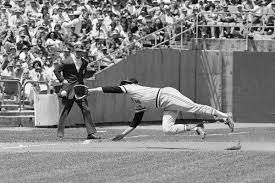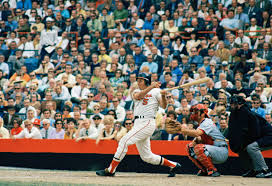Brooks Robinson, grew up in Little Rock Arkansas. Attended what became a few years later Little Rock Central High School. He played Little League, Pony League and American Legion League all in Little Rock. This is listed because I grew up six blocks from Brooks. Our parents went to school together and were friends! Though I am seven years younger I played on the same team that he had ,wearing the same uniform with the same number. In 1955 when he made it to the Orioles and in 1957 he made it to the show he became all of our hero!
Brooks is often regarded as one of the greatest third basemen in the history of Major League Baseball. He built a legacy that transcended mere statistics. Known for his dazzling defensive skills, unyielding work ethic, and loyalty to the Baltimore and the Orioles, Brooks became a symbol of excellence both on and off the field. With a career spanning over two decades, he earned the admiration of teammates, opponents, and fans alike, solidifying his place among baseball’s all-time greats.
.
Brooks’ early years in the majors were a learning experience. He was a raw but promising talent, with some questions surrounding his bat. However, his defensive prowess was immediately apparent. His incredible range, quick reflexes, and sure-handedness at third base were features that would become hallmarks of his career. Over time, Brook’s bat would also develop, but it was his glove that would define his legacy.

Brooks Robinson’s defense was unparalleled. He revolutionized the position of third base, setting a standard for future generations. His ability to field ground balls with remarkable precision, combined with a strong arm and exceptional footwork, made him a nightmare for opposing batters. He was often described as a human vacuum cleaner, scooping up balls with ease that many thought would surely go through the infield.
Brooks won 16 Gold Glove awards over the course of his career (1960–1975), a testament to his consistency and dominance at third base. In fact, his total number of Gold Gloves remains a record for any position player. His work at third base was not just about routine plays; it was his knack for making jaw-dropping, game-saving stops that earned him the admiration of fans and players alike. One of the most iconic moments of Brooks’ career came in the 1970 World Series against the Cincinnati Reds, where he put on an unforgettable defensive performance. His diving stops and laser throws across the diamond were instrumental in helping the Orioles capture the championship.
Brooks’ legacy as a defensive wizard is not confined to his Gold Gloves or his highlight-reel plays. His defensive metrics, especially during the era in which he played, are still revered today. Brookie’s range factor and fielding percentage, key stats for evaluating a fielder’s performance, were consistently among the best in the league. His defensive consistency played a crucial role in the Orioles’ success during his tenure with the team, as they were known for their strong pitching and defense-first mentality.
While Brooks Robinson’s defense was legendary, he was no slouch at the plate either. Over his 23-year career, he amassed over 2,800 hits, including 268 home runs. His offensive numbers are impressive, but it was his ability to deliver in clutch moments that truly stood out. Brooks was known for his poise in pressure situations, particularly in the postseason.
He earned the nickname “The Human Vacuum Cleaner” not only for his defensive feats but also for his timely offensive contributions. In the 1966 World Series, Brooks hit .286 with 2 home runs and 6 RBIs, helping the Orioles sweep the Los Angeles Dodgers to claim their first World Series title. His most famous offensive moment came during the 1970 World Series, where he was named the Series MVP after hitting .429 with 2 home runs and 6 RBIs. His timely hitting, coupled with his stellar defense, cemented his reputation as one of the most complete players of his era.

Brooks’ batting average of .267 for his career might not leap off the page, but it’s important to note that he played the majority of his career during an era when offensive numbers were lower, and he often played in hitter-unfriendly ballparks. Robinson’s ability to produce runs in key moments, along with his overall contribution to the Orioles’ offense, made him an invaluable asset to the team throughout his career.
One of the most endearing aspects of Brooks Robinson’s career was his loyalty to the Baltimore Orioles. Brooks spent his entire 23-season career with the Orioles, a rarity in modern professional sports. He became the face of the franchise and a beloved figure in the city of Baltimore. In an era where free agency and player movement became increasingly common, Brook Robinson’s loyalty was matched by his leadership. As the Orioles’ captain for much of his career, Brooks was known for his work ethic, professionalism, and dedication to his teammates. He was the glue that held the team together, particularly during the Orioles’ commitment to one team that stood as a testament to his character. During his heyday in the 1960s and 1970s, when they won multiple American League pennants and World Series championships.
Brooks Robinson’s impact on the game of baseball was solidified when he was inducted into the Baseball Hall of Fame in 1983. The honor was a fitting tribute to a player whose contributions to the game went beyond numbers and statistics. Brook’s influence extended to future generations of baseball players, particularly those who played third base. His defensive excellence became a blueprint for future players at the position.
In Baltimore, Robinson remains a beloved icon. His number 5 was retired by the Orioles in 1977, and his name is synonymous with the franchise’s success during the 1960s and 1970s. Robinson’s legacy is not just about what he did on the field, but also how he carried himself off the field—always humble, gracious, and charitable.
Brooks Robinson was much more than a baseball player. He was a symbol of consistency, loyalty, and excellence. His defensive brilliance redefined the third base position, and his leadership and clutch performances helped guide the Baltimore Orioles to numerous victories. Brooks Robinson’s legacy as one of the greatest third basemen in MLB history is secure, and his impact on the game will never be forgotten. In a sport that values tradition and respect, Brooks’ name will always be etched in the annals of baseball history. Brooks’ name will always be etched in the lives and people of Baltimore and not just boys but also girls are named after their parents’ hero. My youngest grandson WHO IS ONLY THREE YEAR OLD IS NAMEd after Brooks Robison.

Brooks Robison retired from baseball in September of 1977. In 2022 came back to Baltimore. a a guest of the City of Baltimore and the Orioles to celebrate his Fiftieth Anniversary of his retirement. My wife’s daughter and family were in the front row in the outfield as Brooks went around the inside of Oriole Park at Camden Yards. My grandson and father held up a big printed sign that said “From One Brooks To Another Thank You!”. Brooks died a year later and a friend that attended many games with me went to Books’s Memorial at the Stadium with me. As part of the service they showed a montage made up from shots of Brooks’ life. Brooks and his family had put it together, all of a sudden there was a picture of my family holding the sign! I couldn’t control myself and I yelled “THAT’S MY GRANDSON!” The man in front me turned around saying “really”? My friend said ”Yes, “Al, it really is his grandson Brooks!” It had been years and he now had a gray beard, so I said to my friend Tedd, “Al who”? He said, “Al Bumbry you nut!” Al turned around and said ”I want you to know why that is in the film, it is because of what it meant to Brooks! To him it was the highlight of his Fiftieth Anniversary”! Tears were in all of our eyes. For two boys from Little Rock who met many times during the year, there was no better ending than this Brooks and Brooks saying “Thank You”!
